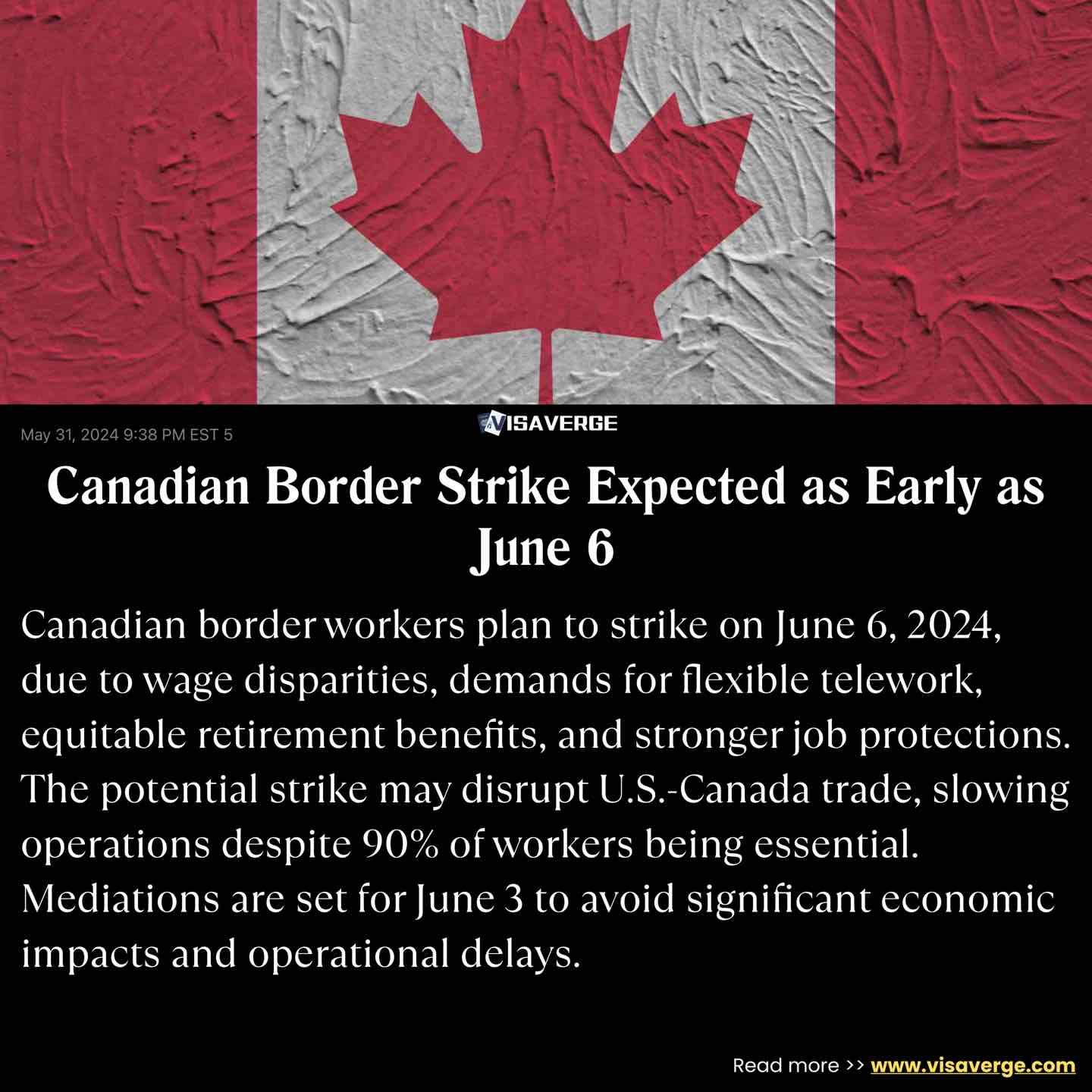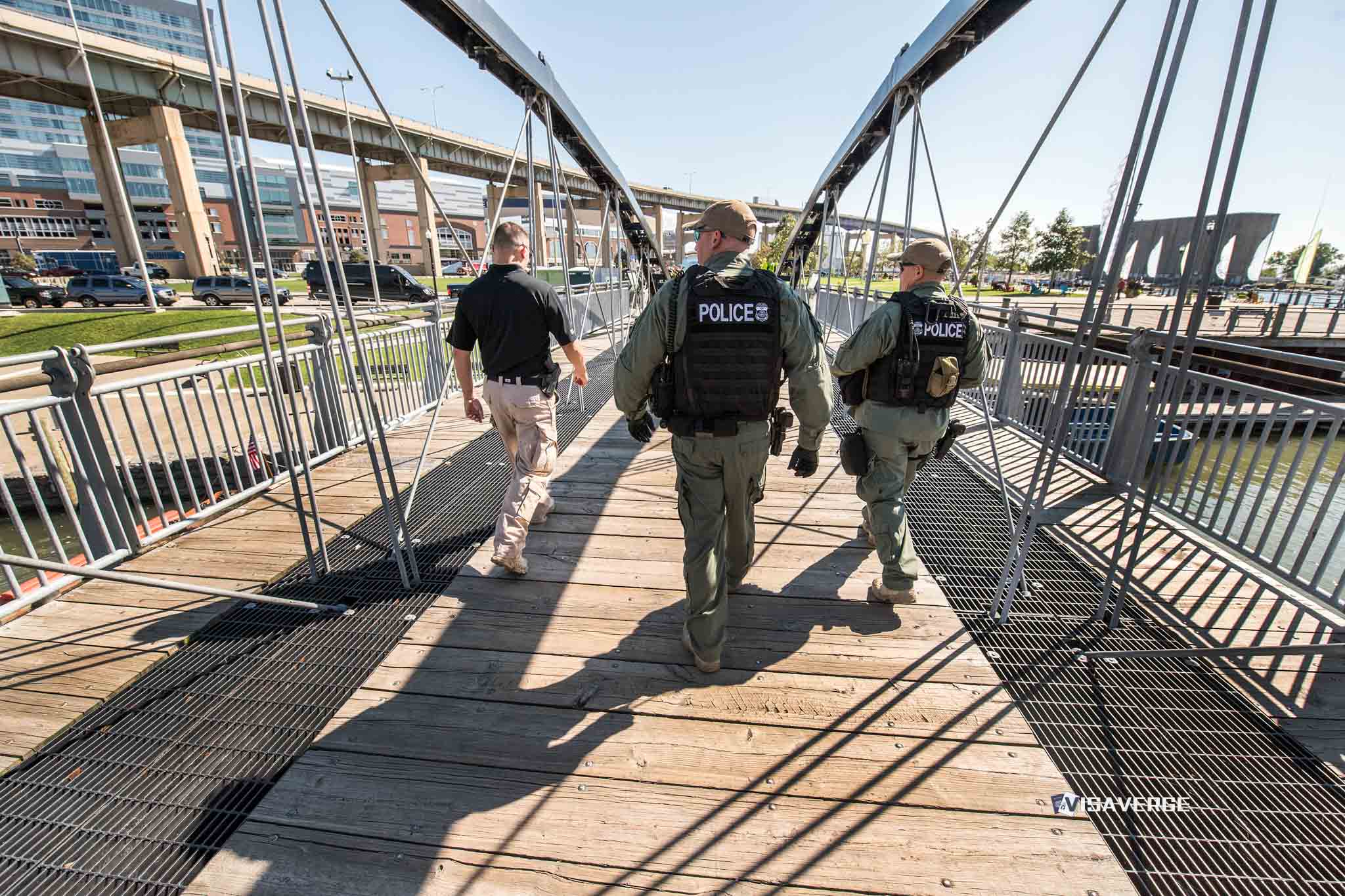Key Takeaways:
- Over 9,000 Canadian border workers may strike on June 6, driven by wage disparities, remote work options, and retirement benefits.
- A potential strike could cause significant delays in cross-border trade and economic disruptions, especially during the busy summer travel season.
- Mediations between the union and the government start June 3, aiming to resolve issues amid economic constraints and high stakes for future labor relations.
Why Are Canadian Border Workers Planning to Strike on June 6?
A significant labor action looms as more than 9,000 Canadian border workers are poised to go on strike potentially as early as June 6, 2024. The union representing these workers, the Public Service Alliance of Canada (PSAC) along with the Customs and Immigration Union (CIU), voted overwhelmingly in favor of job action. This decision was made following rigorous deliberations from April 10 to May 23, concluding with a 96% approval rate from the members.

“The clock is ticking,” remarked Sharon DeSousa, PSAC national president-elect. “At every opportunity, Trudeau’s Liberal government has refused to put the needs of workers first, and time is running out to avoid sweeping job action.”
What Are the Key Issues for CBSA Workers?
Wage Disparities
One of the primary drivers of the potential strike is the issue of wage disparity. The union argues that the current wages of Canada Border Services Agency (CBSA) employees do not compare favorably to those of other law enforcement agencies across the country, such as the Royal Canadian Mounted Police (RCMP). Given that CBSA workers perform similar duties and face equivalent risks, they believe that their compensation should reflect this parity.
Remote Work and Telework Options
Another significant point of contention is the demand for flexible telework and remote work options. In the COVID-19 era, many employees have advocated for the ability to work remotely when possible. The union contends that staff who can perform their duties effectively from home should be afforded this option.
Retirement Benefits
Retirement benefits also play a crucial role in the ongoing dispute. The union seeks the option for CBSA employees to retire after 25 years of service without facing penalties. This benefit is common among other law enforcement and public safety personnel in Canada.
Protections Around Discipline and Technological Change
Stronger protections around disciplinary actions and the implementation of new technologies are also on the list of demands. The union emphasizes the need to ensure that workers are not unfairly penalized and that technological advancements do not adversely impact their working conditions or job security.
How Will a Potential Strike Impact Trade and Daily Operations?
Disruption of Trade
A strike by Canadian border workers could severely disrupt cross-border trade between the U.S. and Canada. Given the vital role CBSA employees play in the smooth functioning of land crossings, airports, and marine ports, any job action could cause significant delays. It is estimated that delays could extend beyond 10 hours at various border points.
Economic Ramifications
The economic impact of such a strike could be profound. The U.S. Department of Agriculture has already issued warnings about potential disruptions in agriculture trade, affecting both producers and consumers. The broader supply chain could also face challenges, creating a ripple effect that impacts various sectors of the economy.
Work-to-Rule Campaign
While approximately 90% of frontline border services employees are required to work during a strike due to their “essential” status, a work-to-rule campaign could still slow down operations significantly. In such a scenario, employees would do no more than the minimum required by the rules of their contract, leading to potential delays and inefficiencies.
What Happened During Previous Strikes?
August 2021 Strike
A brief strike in August 2021 by CBSA personnel caused substantial delays at border crossings, affecting trade and travel. With the prospect of another strike, both the union and the government are keenly aware of the potential for similar, if not greater, disruptions.
What Is the Government’s Position?
The Canadian government has shown a commitment to reaching a feasible agreement with the workers. However, they have also expressed concerns about the affordability of the union’s demands. Economic conditions, including a weakening economy, high interest rates, and increased public debt, have been cited as constraints.
Upcoming Mediation and Negotiations
Mediations between the union and federal officials are scheduled to commence on June 3, 2024. The goal is to reach a mutually agreeable solution before the strike date to avoid significant disruptions during the busy summer travel season. Both parties are under immense pressure to find common ground.
What Are the Broader Implications?
The impending strike may have broader implications for labor relations within Canada’s public sector. It sets a precedent for how wage parity, remote work, and retirement benefits are negotiated in the future. Furthermore, it highlights the critical nature of CBSA jobs and the extent to which these roles impact daily life and commerce.
Steps for Canadian Border Workers
Stay Informed
For those impacted by the potential strike, staying informed is crucial. Regular updates from the Public Service Alliance of Canada (PSAC) and the Customs and Immigration Union (CIU) will provide the latest news and developments.
Understand Your Rights
Union members should familiarize themselves with their rights during a strike. Knowing what to expect and how to navigate the situation can alleviate some uncertainties.
Prepare for Impact
Stakeholders, including businesses and travelers, should prepare for potential delays and disruptions. Contingency plans could mitigate some of the adverse effects a strike may cause.
Conclusion
The looming strike by Canadian border workers is a complex issue driven by demands for fair wages, flexible work options, equitable retirement benefits, and better protections around discipline and technological changes. Both the union and the government are now tasked with finding a resolution in a constrained economic environment. As the negotiations proceed, all eyes will be on the outcome, which may set significant precedents for future labor relations within Canada.
To stay updated on the latest developments and for more information on immigration-related matters, you can visit Canada.ca.
In summary, the potential strike holds critical importance not just for the involved employees but also for the broader Canadian economy and international trade. Reaching an agreement is essential to avoid significant disruptions that could ripple through various sectors. The onus is now on both parties to negotiate in good faith and find a resolution that meets the needs of CBSA workers while taking into account the current economic challenges.
Learn Today:
Glossary of Terms
- Public Service Alliance of Canada (PSAC):
- A major union representing federal government employees in Canada, including Canadian border workers. It plays a significant role in negotiating terms and conditions of employment for its members.
- Customs and Immigration Union (CIU):
- A union that specifically represents workers at the Canada Border Services Agency (CBSA), focusing on their labor rights, working conditions, and other employment-related issues.
- Wage Disparity:
- The difference in wages between employees of similar roles or job descriptions in different organizations or sectors. This term is used to highlight inequalities in compensation, such as those between CBSA employees and other law enforcement agencies like the Royal Canadian Mounted Police (RCMP).
- Work-to-Rule Campaign:
- A form of industrial action where employees perform only the minimum requirements of their job description. This action can cause slowdowns and inefficiencies, especially in critical services like border operations.
- Retirement Benefits:
- Benefits provided to employees when they retire, such as pensions, health care benefits, or the ability to retire early without penalties. The union is advocating for CBSA employees to retire after 25 years of service with full benefits, similar to other law enforcement personnel.
This Article In A Nutshell:
Canadian border workers plan to strike on June 6, 2024, due to wage disparities, demands for telework, and better retirement benefits. Represented by the Public Service Alliance of Canada and the Customs and Immigration Union, they seek recognition akin to other law enforcement agencies. The strike could disrupt trade and travel.
— By VisaVerge.com
Disclaimer: If you use any information from this article, link back to the original article URL on VisaVerge.com. Thank you for respecting our content and giving proper credit.
Read more
- Canada Immigration: Special Measures for Haitians
- Canada Announces Haiti Crisis Aid Measures
- Canada’s Immigration Policy and Its Impact on Population Growth
- Canada Eliminates Police Clearance for Temporary Residents
- Canada’s Immigration Crisis: Once Happy Canadians Now Struggling to Smile














